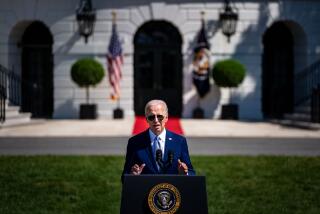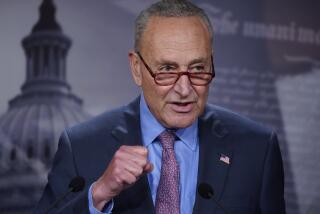The nation needs jobs, not a political agenda
- Share via
Few things bring politicians together like a crisis. And by just about any measure, the worsening economy qualifies as one of those rallying events -- the gross domestic product just declined more than it has in 26 years, the number of people receiving unemployment benefits reached the highest level in at least 41 years, new-home sales dropped to the lowest level on record, the list goes on and on. The outlook is so dim, the Democrats who control Congress and the White House could have crafted the largest stimulus package since World War II and still garnered some Republican support. Instead, the House of Representatives approved the $819-billion American Recovery and Reinvestment Act on a party-line vote, with all 177 Republicans in the chamber opposing and all but 11 of the 255 Democrats supporting it. GOP lawmakers dissented in part because it didn’t meet their predictable demand for more tax cuts. They also complained, however, that too many of the bill’s provisions would advance the Democrats’ agenda, not address the country’s need for jobs. And on that point, they had a legitimate objection.
Stimulating the economy is more of an art than a science. A country relies partly on the strength of its resources -- such as its workers’ productivity, the availability of cheap capital, the markets for its goods -- and partly on consumers’ confidence. The latter is especially important in the United States, where consumer spending accounts for about 70% of the economy. Because any legislative effort to boost employment and end the recession will take months, if not years, to deliver its full benefits, it’s important that the psychic benefits are felt immediately. If people and businesses believe that the effort will improve job security and increase the demand for goods and services, they’ll be more likely to spend more and take more risks. But if they see the stimulus package as just another boondoggle for special interests, they’ll continue the miserliness that is exacerbating the downturn.
President Obama and congressional Democrats have emphasized that their proposal isn’t the typical exercise in pork-barrel politics. Lawmakers haven’t been allowed to pile on earmarks for pet local projects, and the largest sums are being divided among the states and cities through existing formulas. But too many of the items have little apparent connection with economic growth -- witness the nearly $5 billion for prevention, wellness, “comparative effectiveness research” and training in the health field, the $2.1 billion for Head Start and the $300 million to improve teacher quality, just to name a few examples from the 647-page House bill. Other provisions, such as the $64 billion for preventing layoffs at schools, colleges and “high priority” state programs, are about saving jobs, not creating them. In the short term, there may be no difference between preventing job cuts and increasing payrolls -- one prevents a bad situation from worsening, the other makes a good situation better. But an investment this large should pay long-term dividends by increasing productivity, and that’s hard to do when so much of the money is going toward maintaining the status quo.
As for the Republicans’ other point, we think the mix of tax cuts and spending increases in the stimulus package should be based on effectiveness, not ideology. And because there’s no time-tested formula to follow, we’re not offended by the balance struck by Democrats. Tax cuts tend to be more effective when permanent, which poses a problem for the runaway federal budget deficit, and they’ve had more impact in good times than bad, according to a study often cited by the GOP.
But there’s a more important issue implicit in the GOP’s lament over the bill’s contents. Democrats don’t have to accept Republican philosophical arguments about how to stimulate the economy. As Obama reportedly told top lawmakers from both parties at a summit on the bill last month, he won the election, so he gets to lead. And right now, the country is looking for leadership on one thing: the economy. Obama and his allies on Capitol Hill will have plenty of opportunities to advance their views on education, healthcare, poverty and other social issues. But those are battles for another day. They shouldn’t use the stimulus package as a way to circumvent those debates.
More to Read
A cure for the common opinion
Get thought-provoking perspectives with our weekly newsletter.
You may occasionally receive promotional content from the Los Angeles Times.








